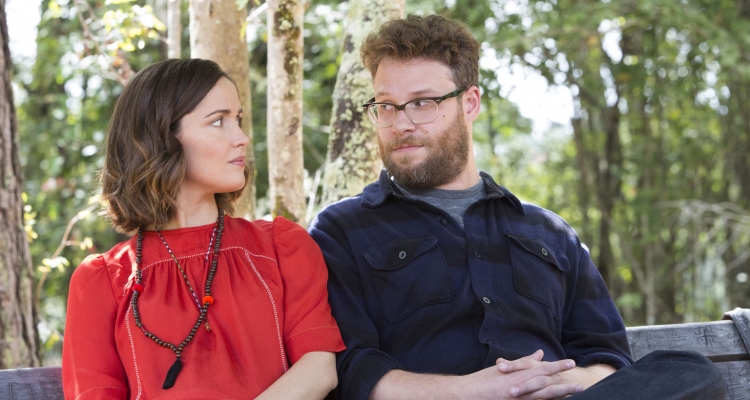The original “Neighbors” is one of the more pleasant surprises of the last few years. On the surface a high-concept comedy of the kind that are usually disappointing and interchangeable, in the hands of “Get Him To The Greek” helmer Nicholas Stoller, it became one of the best studio comedies of the last decade. A consistently funny, good-looking picture that was much more interesting than it had any right to be, “Neighbors” was tighter than the often over-padded norm for the genre, had a strong and entirely relatable thematic core behind it, and featured revelatory performances from Rose Byrne and Zac Efron.
It was also a box office smash, and now, barely two years later, a sequel is here. You can count decent comedy follow-ups on the finger of one hand, more or less, but “22 Jump Street” did prove a recent textbook example of how to follow-up your beloved R-rated comedy smash with a film that’s almost as good. Can “Neighbors 2: Sorority Rising” manage the same feat? Not quite, but that doesn’t mean that it’s a washout either.

If you missed the first film, it saw young married couple Mac (Seth Rogen) and Kelly (Rose Byrne) clash with the fraternity in the house next door, led by the dreamy Teddy (Zac Efron). In the follow-up, a few years have passed, Mac and Kelly’s baby is now an adorable toddler, they have a second daughter on the way, and they’ve just sold the house to another couple (“Broad City” star Abbi Jacobson and “Veep” standout Sam Richardson, who could have used a little more material). Meanwhile, Teddy’s frat brothers are growing up, while he’s still purposeless and working at Abercrombie & Fitch (and is rapidly finding himself the oldest person there, to the extent that they’ve made him put his shirt on).
Teddy soon finds some drive when he stumbles across Shelby (Chloë Grace Moretz), Beth (Kiersey Clemons) and Nora (Beanie Feldstein). They’re three college freshmen who’ve arrived full of hope (particularly Shelby, who was never especially popular in high school), but have swiftly found that the frat parties are creepy and rapey, and sororities aren’t even allowed to hold their own parties in a sexist bit of Greek bylaw. He agrees to help mentor them in setting up their own sorority, but the house they’ve picked out is his old one, right next to Mac and Kelly, who need peace and quiet for 30 days to get past escrow. And so the battle lines are drawn again.

As with “22 Jump Street,” the film’s pretty unashamed in that it’s following the same template as the original, structurally. Given the quick turnaround between films, you could perhaps forgive the filmmakers for not forging new ground, but nevertheless, while “Neighbors” mostly felt tight and thematically coherent, there’s a slightly slapdash, sloppy feeling to the follow-up. There’s a greater sense of throwing stuff against the wall and seeing what sticks (it’s notable how much material from the marketing campaign isn’t in the final film).
It means that the slim 93-minute runtime of “Neighbors 2: Sorority Rising” feels significantly more padded-out and hit-and-miss than the original, but there is still a fair amount that does stick. For every slightly wasted sequence (a big sequence set at a tailgate fails to ever take off in the way that it threatens to), there’s an inventive new joke or fun bit of character development (there’s a recurring Minions-related gag that’s particularly funny). And though indebted to the original, the sequel mostly avoids the temptation to repeat the same jokes as the first film, a trap all too many comedy sequels fall into (looking at you, “Pitch Perfect 2,” which gets thrown a bit of shade).

And at its best, the film becomes something winningly subversive. As Rogen acknowledged in a recent interview, we’re living in a different world than the bro-com-dominated one he came up in, and the film proves that you can be progressive while still delivering filthy gut-laughs. Shelby and the Kappa Nu girls are driven by a desire to kick against society’s sexism, and while the film throws a few digs their way, it’s entirely on their side as well, planting a pleasingly feminist flag in the ground.
Furthermore, one character from the original has come out as gay in a way that’s treated not as a joke, but as a sign of personal development, and the film’s biggest and angriest laugh comes at the expense of men’s-rights-activist types. For a genre that’s always had its feet planted in the fratty, post-“Animal House” world, it’s utterly refreshing and a sign of increasing maturity for the people who make them.

That said, and despite mostly winning performances (Byrne remains the MVP, though Moretz is the best she’s ever been here, and Kiersey Clemons has an utterly beguiling comic presence, confirming that after “Dope,” big things are coming her way), this isn’t quite worthy of its predecessor. It’s a little too straggly, and its core of millennials-dealing-with-getting-old-and-learning-to-parent doesn’t bring anything new to the table that wasn’t addressed in “Neighbors.”
But still, fans of the original won’t be too disappointed, and there are still more laughs (and quietly, though it wouldn’t admit to it, more brains) than in the vast majority of quickie comedy sequels. You’d rent rather than buy, as it were, but there are still worse places to live. [B-]

